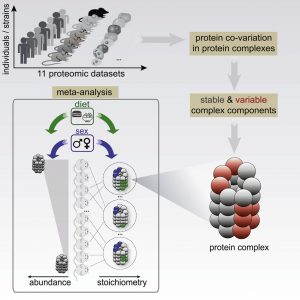The old nature-versus-nurture idea is getting a new dimension, courtesy of proteomics, a scientific discipline devoted to the comprehensive characterization of the proteome, the protein universe within individual organisms or cells. Unlike the genome, which is a static repository of genetic information, the proteome is dynamic, fluctuating depending on environmental or lifestyle influences. Since the proteome may fluctuate into health- or disease-sustaining configurations, environmental or lifestyle influences that affect an individual’s proteome could make or break new forms of personalized medicine.
To determine the extent to which genetic and environmental influences on the proteome could be distinguished, scientists based at the European Molecular Biology Laboratory (EMBL) Heidelberg analyzed 11 large public datasets containing detailed information on different proteotypes, or individualized proteomes, in humans and mice, as well as their diet and genetic status. The scientists, led by Peer Bork, head of unit, senior scientist, and strategic head of bioinformatics at EMBL, found that a surprisingly large amount of proteotype variation is determined by sex and diet.
Detailed results appeared April 25 in the journal Cell, in an article titled, “Disentangling Genetic and Environmental Effects on the Proteotypes of Individuals.”
“We find that … genetic sex and specific diets together explaining 13.5% and 11.6% of the observed variation of complex abundance and stoichiometry, respectively,” the article’s authors wrote. “Sex-specific differences, for example, include various proteins and complexes, where the respective genes are not located on sex-specific chromosomes.”
According to the authors, diet-specific differences, added to the individual genetic backgrounds, might become a starting point for personalized proteotype modulation toward desired features.

Before the current study, only a few proteins were known to be up- or downregulated according to the genetic sex of an animal or its diet. Sex-specific differences, for example, are usually traced back to chromosome X/Y-specific gene expression.
The new study suggests that many proteins are affected by lifestyle factors. “It’s impressive that these two factors, sex and diet, already account for a large part of an individual’s proteotype,” said Natalie Romanov, the Cell paper’s first author and a postdoctoral researcher in Bork’s group at EMBL Heidelberg.
The future of medical treatment lies in personalized medicine, in which products are tailored to individual patients. So far, most studies have focused on adapting treatments to the genotype—the genetic makeup of a cell encoded in the DNA. However, while some rare diseases are clearly genetically determined, for most diseases the environment plays a major role and the genome of the patient only has a minor contribution.
“In the case of obesity, for example, only about 6% of the variation in the body mass index can be explained by the associated genetics,” noted Bork. “The proteotype reflects not only the genetics but also environmental aspects, for example, the lifestyle. As such, understanding proteotypes holds great promise for providing lifestyle-associated fingerprints in individuals.”
This study provides a major stepping stone in understanding which cellular alterations in a diseased individual can be potentially reversed by changing lifestyle. This knowledge could not only be useful for disease diagnosis but also to individualize therapies in the future.
“The results provide a first step only. It can be assumed that many other parameters besides sex and diet need to be fully tested to potentially reshape the proteotype of an individual from a diseased to a healthier state,” concluded Martin Beck, group leader and senior scientist at EMBL and one of the current paper’s co-authors. “To understand most of the differences in proteotypes of individuals many more such datasets need to be collected. We also need to test for many more environmental and genetic factors before respective diagnostics and individualized therapies can be pushed into the clinics.”
The post Sex- and Diet-Specific Proteome Differences Distinguished appeared first on GEN – Genetic Engineering and Biotechnology News.












